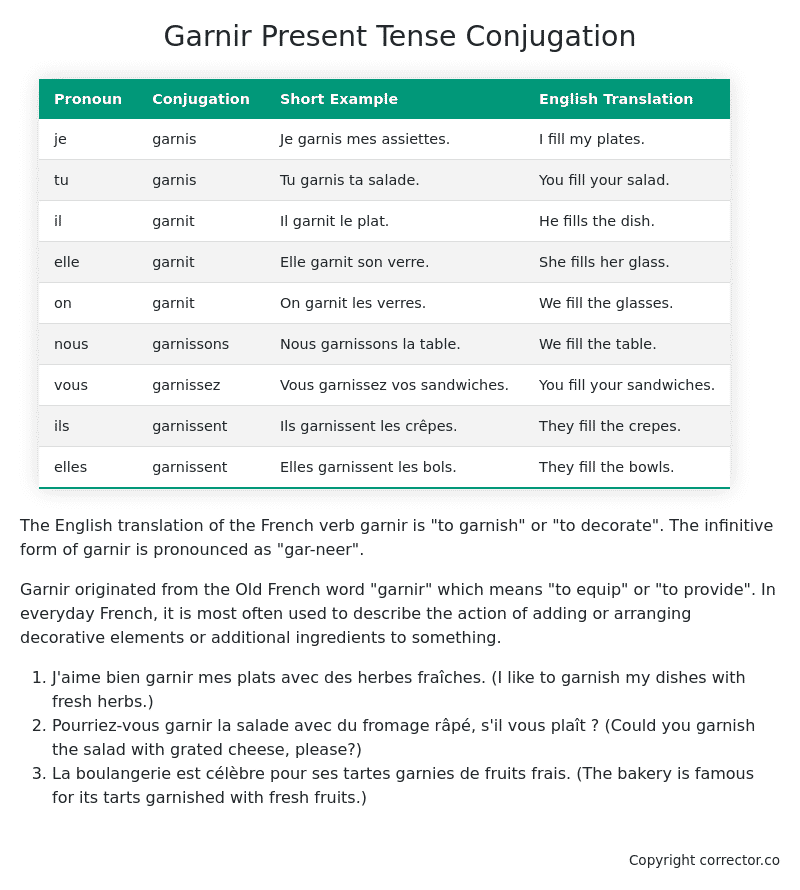Le Present (Present Tense) Conjugation of the French Verb garnir
Introduction to the verb garnir
The English translation of the French verb garnir is “to garnish” or “to decorate”. The infinitive form of garnir is pronounced as “gar-neer”.
Garnir originated from the Old French word “garnir” which means “to equip” or “to provide”. In everyday French, it is most often used to describe the action of adding or arranging decorative elements or additional ingredients to something.
- J’aime bien garnir mes plats avec des herbes fraîches. (I like to garnish my dishes with fresh herbs.)
- Pourriez-vous garnir la salade avec du fromage râpé, s’il vous plaît ? (Could you garnish the salad with grated cheese, please?)
- La boulangerie est célèbre pour ses tartes garnies de fruits frais. (The bakery is famous for its tarts garnished with fresh fruits.)
Garnir – About the French Present Tense
To take a deep dive into all the French tenses then see our article on Mastering French Tense Conjugation.
Common Everyday Usage Patterns For Le Present
Interactions with Other Tenses
Table of the Present Tense Conjugation of garnir
| Pronoun | Conjugation | Short Example | English Translation |
|---|---|---|---|
| je | garnis | Je garnis mes assiettes. | I fill my plates. |
| tu | garnis | Tu garnis ta salade. | You fill your salad. |
| il | garnit | Il garnit le plat. | He fills the dish. |
| elle | garnit | Elle garnit son verre. | She fills her glass. |
| on | garnit | On garnit les verres. | We fill the glasses. |
| nous | garnissons | Nous garnissons la table. | We fill the table. |
| vous | garnissez | Vous garnissez vos sandwiches. | You fill your sandwiches. |
| ils | garnissent | Ils garnissent les crêpes. | They fill the crepes. |
| elles | garnissent | Elles garnissent les bols. | They fill the bowls. |
Other Conjugations for Garnir.
Le Present (Present Tense) Conjugation of the French Verb garnir (this article)
Imparfait (Imperfect) Tense Conjugation of the French Verb garnir
Passé Simple (Simple Past) Tense Conjugation of the French Verb garnir
Passé Composé (Present Perfect) Tense Conjugation of the French Verb garnir
Futur Simple (Simple Future) Tense Conjugation of the French Verb garnir
Futur Proche (Near Future) Tense Conjugation of the French Verb garnir
Plus-que-parfait (Pluperfect) Tense Conjugation of the French Verb garnir
Passé Antérieur (Past Anterior) Tense Conjugation of the French Verb garnir
Futur Antérieur (Future Anterior) Tense Conjugation of the French Verb garnir
Subjonctif Présent (Subjunctive Present) Tense Conjugation of the French Verb garnir
Subjonctif Passé (Subjunctive Past) Tense Conjugation of the French Verb garnir
Subjonctif Imparfait (Subjunctive Imperfect) Tense Conjugation of the French Verb garnir
Subjonctif Plus-que-parfait (Subjunctive Pluperfect) Tense Conjugation of the French Verb garnir
Conditionnel Présent (Conditional Present) Tense Conjugation of the French Verb garnir
Conditionnel Passé (Conditional Past) Tense Conjugation of the French Verb garnir
L’impératif Présent (Imperative Present) Tense Conjugation of the French Verb garnir
L’infinitif Présent (Infinitive Present) Tense Conjugation of the French Verb garnir
Struggling with French verbs or the language in general? Why not use our free French Grammar Checker – no registration required!
Get a FREE Download Study Sheet of this Conjugation 🔥
Simply right click the image below, click “save image” and get your free reference for the garnir Present Tense tense conjugation!

I hope you enjoyed this article on the verb garnir. Still in a learning mood? Check out another TOTALLY random French verb present conjugation!


